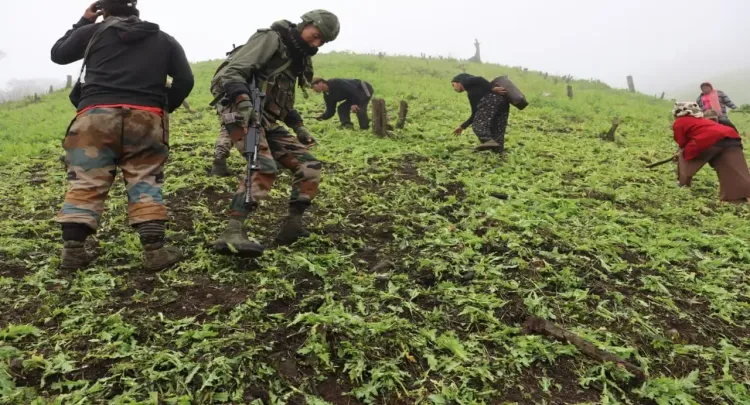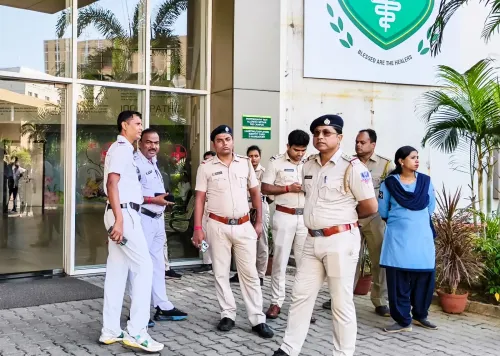Assam Rifles and Police Eliminate Illegal Poppy Cultivation in Manipur

Imphal, Dec 8 (NationPress) The Assam Rifles along with the Manipur Police took decisive action against extensive illegal poppy farming in the Chandel and Ukhrul Districts, as reported by officials on Sunday.
An official spokesperson from the Assam Rifles mentioned that, as part of a determined initiative to tackle illegal activities, the para-military unit, in partnership with the residents of Saibol Joupi, TM Dingpi, and T Bollon, successfully eradicated around two square kilometers of unlawful poppy cultivation in Chandel district.
This operation is a component of a larger strategy aimed at enhancing community health and social welfare, the spokesperson stated.
The official elaborated that the operation followed comprehensive awareness campaigns conducted by the Assam Rifles, designed to inform local populations about the harmful consequences of poppy farming.
These efforts encouraged villagers to adopt a proactive role against unlawful farming, showcasing their dedication to nurturing a safer and healthier environment.
“This collaboration illustrates the collective determination of both security forces and local communities in confronting the issues brought about by illegal cultivation,” the spokesperson remarked.
He added that the operation not only disrupted the supply chain linked to illegal activities but also set the stage for a more peaceful and progressive future for the region.
The Assam Rifles acknowledged the active participation of the villagers, emphasizing the increasing cooperation between communities and security forces in fostering development and stability in Northeast India.
Additionally, the Manipur Police, in a separate operation, destroyed 30 acres of illegal poppy farming in the Khamason range of Ukhrul District and apprehended four individuals.
Commending the police efforts, Manipur Chief Minister N Biren Singh expressed in a post on X on Sunday, “Kudos to the Manipur Police for their relentless commitment to the 'War on Drugs' initiative. On the night of December 6, the Manipur Police reached a significant achievement in combating the drug issue by detaining four individuals involved in poppy cultivation covering approximately 30 acres in the Khamason range, Ukhrul District.”
The Chief Minister affirmed that the state government remains resolute in its objective to eliminate the drug crisis from Manipur.
A government report revealed that various law enforcement agencies, including the Manipur Police, have eradicated 19,135.60 acres of illegal poppy farming across the state’s 12 districts from 2017 to 2024.
This report, compiled by the Manipur Remote Sensing Applications Centre (MARSAC), indicated that the most considerable areas of 4,454.4 acres of illegal poppy cultivation were destroyed in the mountainous Kangpokpi district over the last seven years (2017-2024), followed by 3,348 acres in Ukhrul and 2,713.8 acres in Churachandpur.
MARSAC operates as an autonomous institution under the Planning Department of the Manipur government.
The report noted that deforestation resulting from extensive poppy farming has led to several detrimental effects on the ecosystem, including soil erosion, biodiversity loss, and alterations in the local climate.
The Manipur government has frequently stated that the ongoing ethnic tensions in Manipur, which have persisted since May last year, have been exacerbated by illegal immigrants from Myanmar, who have engaged in illicit poppy farming after settling in the state unlawfully.
The Chief Minister's 'War on Drugs' initiative has significantly targeted the unlawful activities of these illegal immigrants, according to a government statement.
The statement also highlighted that since 1969, there has been a rise in the number of villages in the districts of Kangpokpi, Tengnoupal, Chandel, Churachandpur, and Pherzawl by 893, increasing from 731 to 1,624.
“An abnormal 122 percent surge in the emergence of villages, many situated in forested areas, in the five hill districts, which are predominantly inhabited by the Kuki community or have a significant Kuki population,” the government statement asserted.
In contrast, in the other hill districts of Tamenglong, Noney, Senapati, Ukhrul, and Kamjong, which are predominantly Naga, the growth during the same period was a mere 49, from 527 to 576, representing only a 9 percent increase.










